President Tsai Ing-wen (蔡英文) was yesterday set to become the first Taiwanese president to meet with a US House of Representatives speaker on US soil, as she was scheduled to meet with House Speaker Kevin McCarthy.
Tsai arrived in Los Angeles on Tuesday night after visiting New York, Guatemala and Belize.
She was scheduled to meet with McCarthy at the Ronald Reagan Presidential Library in Simi Valley at 10am, McCarthy’s office said.
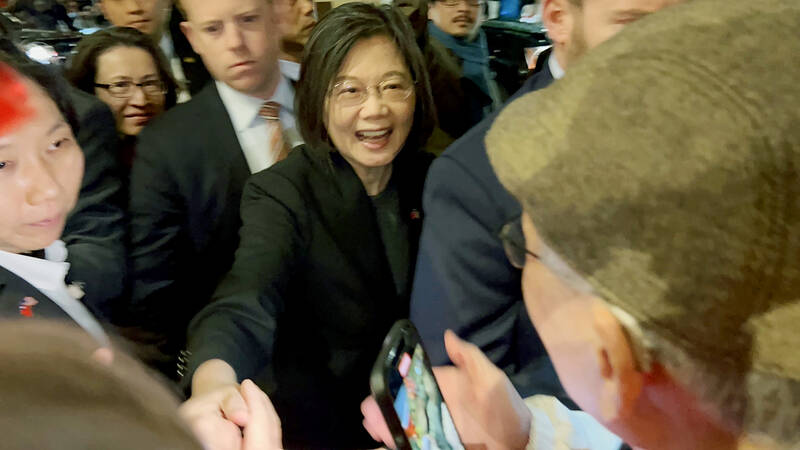
Photo: CNA
Tsai and McCarthy would issue a joint statement after the closed-door meeting, while lawmakers who take part would hold a news briefing in the afternoon, the office said.
It would be the third time a Taiwanese president would have met with a House speaker since Taipei and Washington severed diplomatic ties in 1979.
The first meeting occurred in 1997, when then-House speaker Newt Gingrich met with then-president Lee Teng-hui (李登輝) in Taipei, and the second took place in August last year, when then-House speaker Nancy Pelosi met with Tsai, also in Taipei.
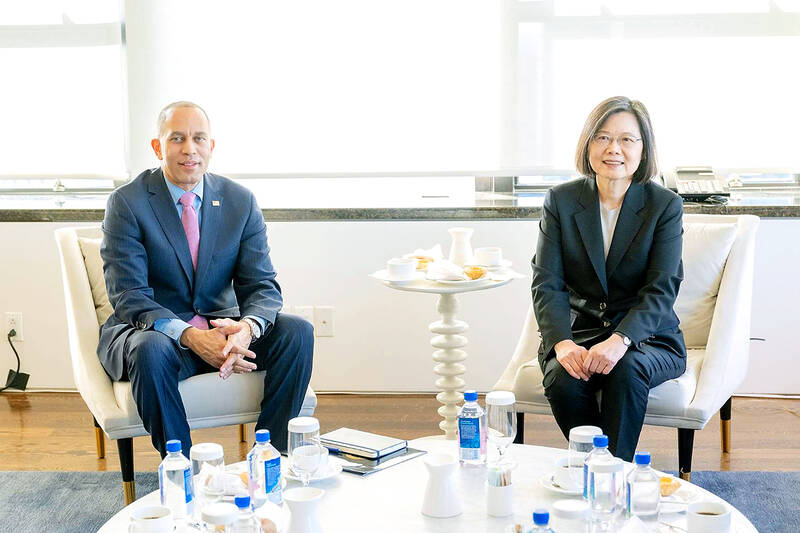
Photo courtesy of President Office
Presidential Office Deputy Secretary-General Xavier Chang (張惇涵) would not disclose the list of US lawmakers who were to attend the Tsai-McCarthy meeting when asked about the issue aboard the president’s charter flight on the way to Los Angeles.
However, a source told the Central News Agency that Republican US Representative Mike Gallagher, who chairs a new House select committee on China and who visited Taiwan in February, and Democratic US Representative Raja Krishnamoorthi, a senior member of the China committee, would be in attendance.
China has objected to the meeting, warning that it would take “resolute measures” to protect its sovereignty.
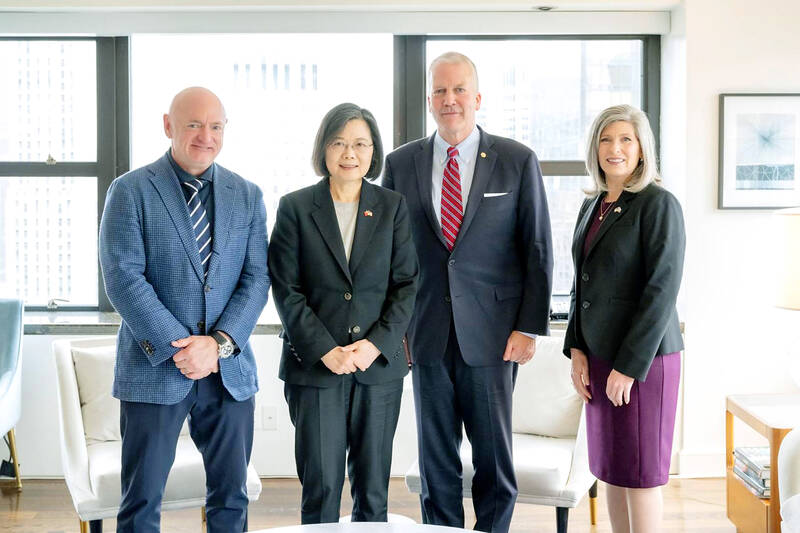
Photo courtesy of President Office
Chinese Ministry of Foreign Affairs spokeswoman Mao Ning (毛寧) on Monday said that Beijing strongly opposes “any form of official interaction and contact between the US side and Taiwan authorities.”
Presidential Office spokeswoman Lin Yu-chan (林聿禪) said that “China is not in a position to meddle in” the matter, because Taiwan and its 23 million people have the right to engage with other democratic countries.
US National Security Council spokesman John Kirby reiterated the US position, cautioning China not to overreact to the meeting, US media reported.
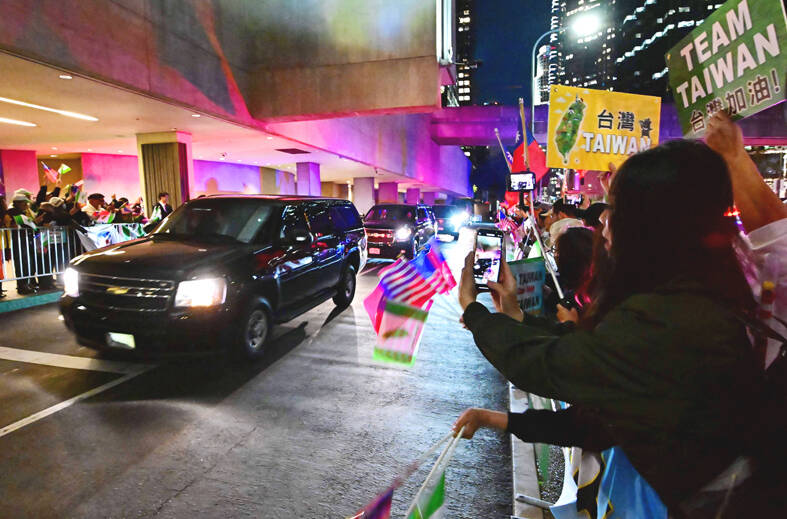
Photo: AFP
“We’ve certainly seen some rhetoric coming out of Beijing with respect to President Tsai Ing-wen’s transit,” Kirby said.
He said Tsai and “every other previous president of Taiwan has transited the United States, so there’s nothing uncommon here. There’s nothing atypical about it and there’s no reason for the Chinese to overreact.”
Tsai separately met with Hakeem Jeffries, the top Democrat in the House of Representatives, on Thursday last week and had breakfast with Republican US senators Dan Sullivan and Joni Ernst, and Democratic US Senator Mark Kelly before leaving New York the next day for Central America, Chang said.
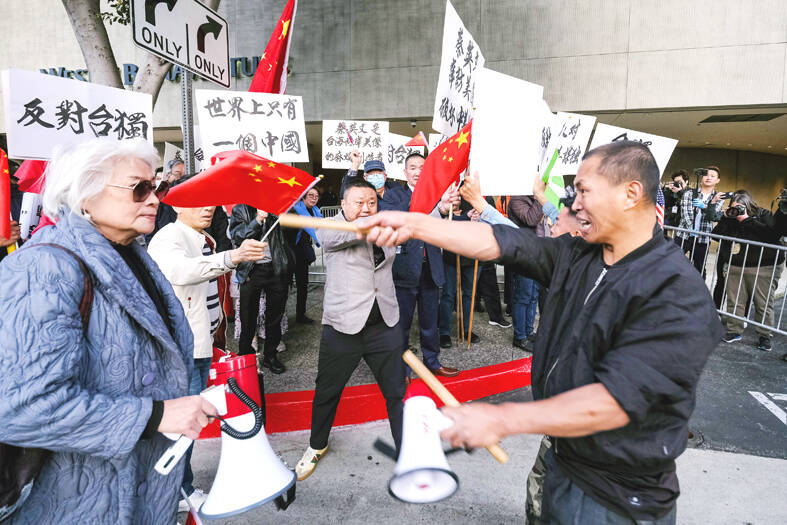
Photo: AP
Tsai expressed her thanks to US President Joe Biden and members of the US Congress for their support of Taiwan, which she said has allowed Taiwan and the US to overcome multiple challenges together.
The US’ support has also prompted many like-minded countries to pay attention to peace and stability in the Taiwan Strait and the Indo-Pacific region, Tsai said, adding that she hopes the two sides would continue to cooperate on security issues, Chang added.
Tsai said that Taiwan would continue to be a reliable economic and trade partner, and build resilient global supply chains with like-minded countries to help the global economy recover from the COVID-19 pandemic, he said.

INVESTIGATION: The case is the latest instance of a DPP figure being implicated in an espionage network accused of allegedly leaking information to Chinese intelligence Democratic Progressive Party (DPP) member Ho Jen-chieh (何仁傑) was detained and held incommunicado yesterday on suspicion of spying for China during his tenure as assistant to then-minister of foreign affairs Joseph Wu (吳釗燮). The Taipei District Prosecutors’ Office said Ho was implicated during its investigation into alleged spying activities by former Presidential Office consultant Wu Shang-yu (吳尚雨). Prosecutors said there is reason to believe Ho breached the National Security Act (國家安全法) by leaking classified Ministry of Foreign Affairs information to Chinese intelligence. Following interrogation, prosecutors petitioned the Taipei District Court to detain Ho, citing concerns over potential collusion or tampering of evidence. The

‘FORM OF PROTEST’: The German Institute Taipei said it was ‘shocked’ to see Nazi symbolism used in connection with political aims as it condemned the incident Sung Chien-liang (宋建樑), who led efforts to recall Democratic Progressive Party (DPP) Legislator Lee Kun-cheng (李坤城), was released on bail of NT$80,000 yesterday amid an outcry over a Nazi armband he wore to questioning the night before. Sung arrived at the New Taipei City District Prosecutors’ Office for questioning in a recall petition forgery case on Tuesday night wearing a red armband bearing a swastika, carrying a copy of Adolf Hitler’s Mein Kampf and giving a Nazi salute. Sung left the building at 1:15am without the armband and apparently covering the book with a coat. This is a serious international scandal and Chinese

Seventy percent of middle and elementary schools now conduct English classes entirely in English, the Ministry of Education said, as it encourages schools nationwide to adopt this practice Minister of Education (MOE) Cheng Ying-yao (鄭英耀) is scheduled to present a report on the government’s bilingual education policy to the Legislative Yuan’s Education and Culture Committee today. The report would outline strategies aimed at expanding access to education, reducing regional disparities and improving talent cultivation. Implementation of bilingual education policies has varied across local governments, occasionally drawing public criticism. For example, some schools have required teachers of non-English subjects to pass English proficiency

TRADE: The premier pledged safeguards on ‘Made in Taiwan’ labeling, anti-dumping measures and stricter export controls to strengthen its position in trade talks Products labeled “made in Taiwan” must be genuinely made in Taiwan, Premier Cho Jung-tai (卓榮泰) said yesterday, vowing to enforce strict safeguards against “origin laundering” and initiate anti-dumping investigations to prevent China dumping its products in Taiwan. Cho made the remarks in a discussion session with representatives from industries in Kaohsiung. In response to the US government’s recent announcement of “reciprocal” tariffs on its trading partners, President William Lai (賴清德) and Cho last week began a series of consultations with industry leaders nationwide to gather feedback and address concerns. Taiwanese and US officials held a videoconference on Friday evening to discuss the